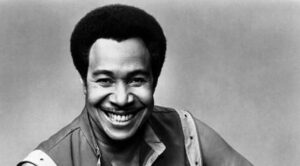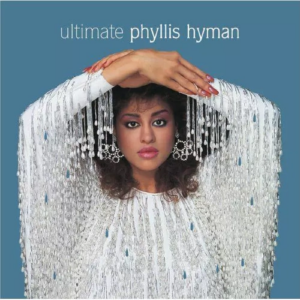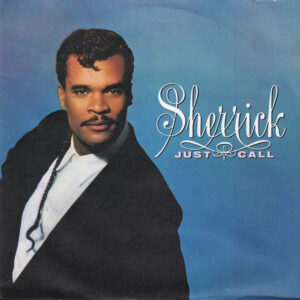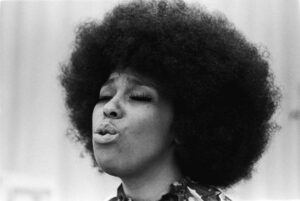One of traditional R&B music’s legendary proponents, Chuck Jackson racked up an impressive twenty-three charted singles between 1961 and 1980. The soul man with the dashing good looks and the distinctive smooth-yet-soulful vocal style was certainly a hitmaking mainstay from the time “I Don’t Want To Cry” climbed to No. 5 on the R&B charts and No. 36 on the Hot 100 in the spring of 1961.
Born in Winston-Salem, North Carolina and raised in Latta, South Carolina, Jackson was already a seasoned performer by the time he joined the stable of Wand Records, a second label started by former New Jersey housewife Florence Greenberg, owner and founder of Scepter Records, itself one of the most successful independent companies of the ’60s and recording home to such artists as Dionne Warwick, The Shirelles and B.J. Thomas.
Chuck began his musical journey singing in church before – in his own words – “running away to Pittsburgh!” He returned to South Carolina to attend college after which he joined the Raymond Raspberry Gospel Singers, getting his first taste of touring on the nation’s gospel circuit. In 1957, Chuck was offered the chance to join the popular interracial singing group, The Dell-Vikings. While he was not on the group’s major hit singles, he did experience life on the road: a conversation with the late Jackie Wilson led Chuck to strike out on his own. He recorded singles for a number of labels without any success but hooking up with Wilson proved fortuitous: performing as a part of the hugely popular singer’s revue gave Jackson a chance to be seen and heard by audiences at such theaters as The Regal in Chicago, the Uptown in Philadelphia, the Howard in Washington DC and of course, The Apollo in New York.
It was at the famed Harlem venue that Chuck got his big break when Scepter owner Greenberg and her A&R man Luther Dixon saw him perform during Jackie Wilson’s show. Other labels such as Brunswick (Wilson’s longtime recording home), RCA and Columbia had shown interest but Jackson decided to go with Scepter, becoming one of the first artists on Wand. In a 2004 phone interview, he recalled that “there was a real family atmosphere there. Everyone knew each other…”
Chuck quickly established himself as one of Wand’s keystone artists: after his initial success with “I Don’t Want To Cry,” he continued his chart run with the beautiful “I Wake Up Crying,” apparently the first song written by Burt Bacharach and Hal David to be done for Scepter/Wand. Bacharach was also responsible for co-writing (with collaborator Bob Hilliard) the perennial “Any Day Now (My Wild Beautiful Bird)” which would become Chuck Jackson’s all-time biggest hit, reaching No. 2 on the R&B charts and No. 23 on the pop listings.
Recording some ten albums for Wand – including 1965’s popular “Mr. Everything” which included a version of Bacharach & David’s “I Just Don’t Know What To With Myself” (originally recorded by Wand labelmate Tommy Hunt), Chuck’s name continued to appear on marquees as a nationwide headliner even though his success as a recording artist had its peaks and valleys. The excellent “I Keep Forgettin,'” written by the famed team of Jerry Leiber and Mike Stoller (the men behind many of the hits by The Coasters and The Drifters, and of course, Elvis Presley) didn’t make any chart impression but “Tell Him I’m Not Home,” with Doris Troy of “Just One Look” fame offering the female vocal part on the song, did. The song became Chuck’s last Top 20 R&B hit until he was teamed with Wand’s other main R&B hitmaker, Maxine Brown to cover “Something You Got,” another Leiber-Stoller tune previously cut by New Orleans’ singer Alvin Robinson. In between, there was a flurry of singles – such as a cover of southern soul man William Bell’s “Any Other Way” but nothing took hold like the duet with Brown. The result was a Top 10 R&B hit on 1965, two more charted singles and two albums together.
But Chuck’s association with Wand was nearing its end: “I had a longstanding relationship with Berry Gordy and his family even before he started Motown. Smokey Robinson – with whom I toured a lot – was trying to get me on the label for years,” Chuck stated in a February 2004 conversation. “Florence Greenberg and I got into an argument on the phone after she refused to pay for my musicians to perform with me at a disc jockey convention. She told me if I didn’t like it, I could leave but that it would cost me. I asked her how much! Then I called Smokey and I told him if he wanted me on Motown, I was ready but I needed help getting the money to buy my contract from Wand. Three days later, I walked into Florence’s office with a check. She took it but she was in tears. She really didn’t want me to go…”
Unfortunately, Chuck’s three years with Motown did not restore him to chart-topping status. Jackson, 2004: “The first thing Motown did was put me on the road with The Supremes. Then I went out with The Four Tops. I spent most of the time with Motown touring. I recorded two albums but I was basically ‘cold’ apart from doing “Are You Lonely For Me Baby.” There’s a funny story behind that: when I first joined Wand, I was walking into the offices at 1650 Broadway and this guy stopped me. He told me, ‘I’m a big fan of yours and I have a song for you.’ I explained that I didn’t really pick my own material, that Luther Dixon did. I let Luther hear it but he said we already had songs ready for the next album so the guy – Freddie Scott – took the song, did it himself a few years later and had a big hit with it. When I got to Motown, I asked them if I could record the song…”
A short stop at ABC in 1973 did not provide a reversal of fortunes for the soul man. He spent a few years with the New Jersey-based All Platinum Records working with the label’s mainstay group The Moments, label owner Joe Robinson’s wife Sylvia (of “Pillow Talk” fame) and Philadelphia artist/producer/songwriter Bunny Sigler and came through with one hit, “I’m Needing You, Wanting You” in 1975. “Joe and Sylvia were my neighbors in New Jersey at the time and I recorded a lot for the company but not much of it was released,” Chuck recalled.
His last ‘major’ label stop was with EMI in 1980: “I got with EMI through Don Taylor, who worked with Bob Marley. Don started out years before as my valet…and established himself in the business. Once I got with the label, Don took me and my old Wand producer Luther Dixon to Jamaica to Bob’s studio and I recorded “I Wanna Give You Some Love” there…” Since its release, Chuck Jackson has kept himself busy, performing and touring on a consistent basis. On the board of The Rhythm & Blues Foundation, Chuck Jackson also produced special events shows at New York’s Apollo Theater where he jumpstarted his solo career several decades ago.
Contributed by David Nathan, https://www.soulmusic.com/









